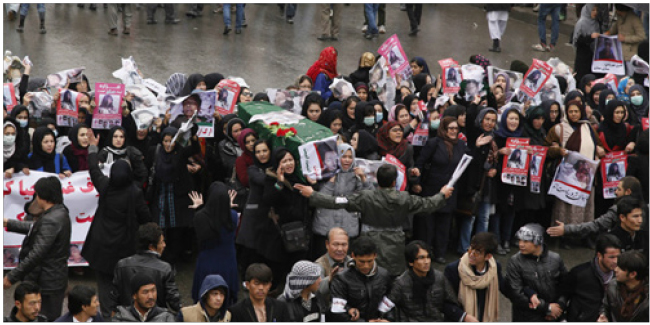The Islamic State in Iraq and Syria (ISIS) has ushered in sectarian violence in Afghanistan. Of late, an upswing in sectarianism is widely felt across the country and the ethnic minority groups suffer in one way or another. One’s rights and dignity are trampled upon on the basis of his/her race, sex, beliefs, color or sects. The very basic rights i.e. the rights to life, liberty and property of men and women are violated flagrantly under the nose of a democratic government – which has vowed to “form a civil society void of oppression, atrocity, discrimination as well as violence, based on rule of law, social justice, protecting integrity and human rights, and attaining peoples’ freedoms and fundamental rights”.
The ISIS militants decapitated seven Shia Muslims, including two women, four men and a child on Sunday, after abducting them last month on the way between Ghazni and Zabul provinces. Thousands of Kabul residents staged demonstration against the hate crime on Wednesday. A number of angry protestors accused the government of neglecting the abductees. Similarly, some civil society activists accused the government of not doing enough for the release of the kidnapped passengers. The protests included women and men from Afghanistan’s different ethnic groups carried the placards of the victims’ pictures and marched on the Presidential Palace to urge the government to take action against rising violence against Afghan civilians.
“We want justice not just for them but for the thousands of other innocent people who are brutally killed this way, almost every day. We don’t care if they were Shia Muslims or not. For us they are human and they were killed in the most brutal way. What was their fault?” one of the protestors is quoted as saying.
It is said that President Ashraf Ghani has instructed his second vice president, Sarwar Danish, deputy of executive officer, Muhammad Muhaqiq and ministers of tribal and transport to go to Ghazni province for sharing grief and the funeral of seven hostages.
Sayed Zafar Hashemi Deputy Spokesman of Afghan President has said that eight hostages were released by National Directorate Security (NDS) following an operation. He pointed out that the council decided to punish those who neglected in releasing seven passengers beheaded by ISIS. According to him, efforts are underway to free other abductees from the armed oppositions of the government.
Meanwhile, media outlets reported that the Taliban insurgents have hanged eight members of the ISIS group allegedly being involved in beheading the hostages. In recent months, a skirmish broke out between the Taliban and ISIS insurgents in restive districts of Afghanistan as the Islamic State (IS) militants seek to replace the Taliban’s emirate into Baghdadi’s caliphate. “Insecurity continues to grip Afghanistan after the withdrawal of international forces in recent years. Violent clashes between two armed groups in southern Afghanistan erupted last Saturday, resulting in the death of at least 60 fighters from both sides.” Although, the Taliban have declared that they hanged the IS’s members for being involved in recent hate crime, nonetheless, it would be naïve of one to express optimism over the Taliban’s practices. The Taliban’s cruelty is no more secret for the world. As a result, the Taliban beheaded a large number of innocent Afghans during their regime on the grounds of their race and beliefs. So, their acts of hanging were for personal revenges.
During the Taliban regime, sectarian violence reached its peak. The minorities suffered heavy casualties as a result of Taliban’s fundamental ideology and puissant sense of ethnocentrism. They imposed their warped beliefs on the barrel of gun – as the ISIS do across the Middle East. Their totalitarianism and egotism, which rooted in their spurious faith, resulted in a whole can of worms. The voices, raised for rights or freedom, were repressed. Women lost their spouses and children were orphaned, mostly for having a certain type of beliefs, and many families were left without bread-bringer. Such cruelties are known internationally and the history keeps bleeding with the painful wounds.
However, after the downfall of the Taliban’s regime, the nascent democracy seemed a panacea for the problems and Afghans hoped and prayed for the best. The strident discourse for human rights, freedom, etc. reverberated across the country and people exulted over the fall of those who threatened their lives and liberties.
Ill-fatedly, the comfort was fleeting and the public hope did not last long. The militants soon sought to foment sectarianism. Currently, they muddy the water, either under the white flag of Taliban or black flag of ISIS, to make use of the opportunity in their own political interests. Their appetite for turbulence and terror originate in their fundamental ideologies.
The Afghan officials have to adopt an effective strategy to end militancy and sectarian violence and provide security for the citizens irrespective of their race, sex, color, etc. Article 6 of the Afghanistan Constitution declares, “The state shall be obligated to create a prosperous and progressive society based on social justice, preservation of human dignity, protection of human rights, realization of democracy, attainment of national unity as well as equality between all peoples and tribes and balance development of all areas of the country.” So, the officials have to practice their legal obligations and secure the environment for the citizens to exercise their rights freely.

